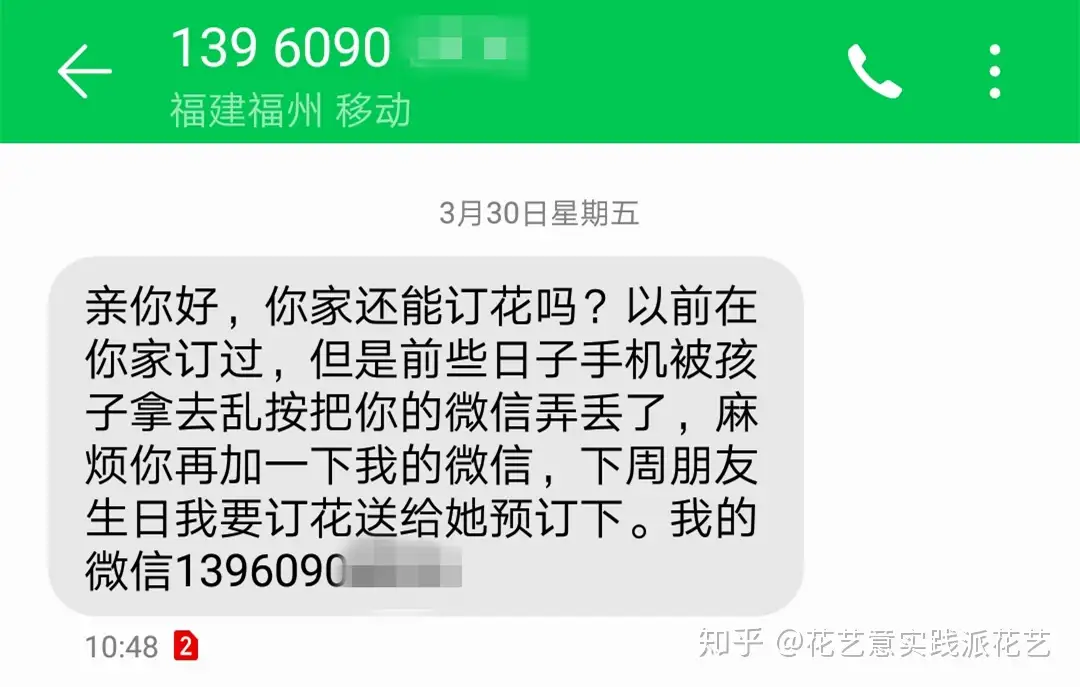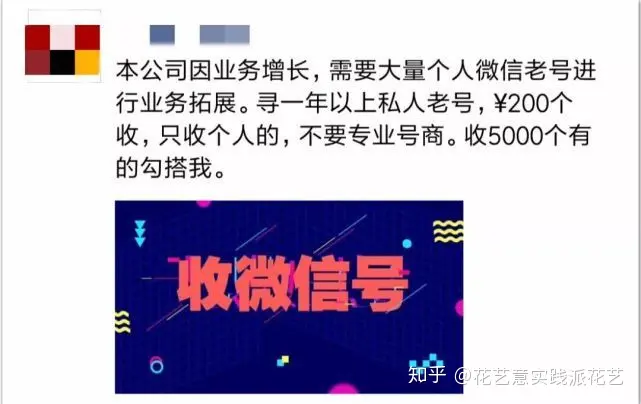Some small scams and tricks that need to be identified when opening a flower shop
[Hua11.com Original] Flowers hold a special allure. Those of us who operate flower shops and floral studios are drawn to their beauty and dedicate ourselves to this business. Our passion lies in the intricate connection between people facilitated by these natural wonders.
However, in society, there are always individuals who fail to appreciate this passion. Instead, they exploit the immense energy fueled by our love for flowers—a heartfelt and selfless force. These opportunists seek to manipulate our devotion for their own hidden agendas.
In this article, based on real cases encountered by Hua11.com (including an explicit scam and a concealed cooperation trap), we aim to caution florists. Stay vigilant and avoid falling into these traps. Let's delve into the details.
Case One: Text Messages Requesting to Add Friends
As a flower shop or studio owner, you likely publicize your contact information, hoping to connect with potential customers. Posting on social media platforms like WeChat Moments costs little, making it an attractive option.
Imagine receiving a text message like this:

"Ah, an old customer! Must add immediately. Delaying might lead them elsewhere."
You might feel the same urge to add them promptly. However, as someone well-versed in Internet technology, I harbor doubts. Why wouldn't they directly add my WeChat using my mobile phone number? Why spend money on a text message and compose such a lengthy one? Besides, who even remembers phone numbers these days? Could they still have my old flyer? But my promotional material clearly states, "The mobile phone number is the same as the WeChat number"...
Something doesn't quite add up.
Let's delve deeper into the situation:
1. WeChat Number Redundancy:
The text message mentions the WeChat number but doesn't explicitly state, "This mobile phone number is my WeChat number." Instead, it repeats the mobile phone number (WeChat number). This redundancy raises questions. Why not directly add my WeChat using the mobile number? Why spend money on a text message and compose such a lengthy one? Moreover, who even remembers phone numbers these days? Could they still have my old flyer? But my promotional material clearly states, "The mobile phone number is the same as the WeChat number"...
2. Passive Friend Requests:
The sender doesn't initiate the friend request but asks me to add them. If you're familiar with social media promotion, you'll know that actively adding a large number of friends in a short time can trigger platform detection. Your account might be tagged as an "Advertising Account," limiting functions or even leading to a ban. However, if someone else adds you (passive friend requests), the platform doesn't detect it as suspicious. For instance, big influencers often receive numerous fan requests, which is considered normal.
So, this text message encourages you to add them actively, avoiding account risks.
The Routine:
1. Mass Text Messages: Sent in groups.
2. Content Attraction: Lure recipients with intriguing content.
3. Active WeChat Adds: Encourage recipients to add the sender.
The purpose? To "nurture" this WeChat account through unsuspecting users.
Usually, for added security, the sender won't immediately approve your request. They'll wait 2 or 3 days (or longer) before accepting. Why? Because by then, you've likely forgotten why you added them. Once forgotten, you're less likely to delete them.
The benefits of nurturing this account? Beyond the scope of this article, but be wary. This is one of the scams florists may encounter.
Remember, vigilance is key. Here's a screenshot to conclude this case:

Learn from this experience and avoid falling prey to deception.
Case Two: The Cooperation Trap
An old English proverb advises: "Fake it till you make it." Originally, this meant pretending to be a certain type of person or achieving success until it becomes reality. Throughout this process, you adopt a false identity, altering your mindset and external behavior. Gradually, you truly become that person or achieve your goals.
Yes, success can be that straightforward!
This saying frequently appears in success-oriented literature. Another term for this technique is "modeling"—essentially, imitation. Variations include:
- Empty-Handed White Wolf
- Resource Integration (When You Lack Effective Resources)
Why discuss this here? Because many people employ this approach today. They pretend to offer resources but secretly use you to further their own agenda.
This tactic is pervasive, especially among those who appear highly "successful." They project an aura of influence, enticing you to collaborate. For instance:
- They claim to have numerous VIP customers—wealthy, high-quality individuals. They've cultivated strong relationships with these clients and can easily convert them into your customers.
- During a festival, they propose a free "Floral Salon" event for these VIPs. If they enjoy it, they'll become your future customers.
When faced with such an "opportunity," excitement may bubble up. However, what's crucial is maintaining a sense of calm: Why did they choose you?
Resource exchanges are inherently reciprocal. Consider whether you're on equal footing with the other party. If their posture or resources significantly surpass yours, proceed with caution. They might exploit your resources (time, manpower, venue, materials) or benefit themselves at minimal cost. Whether these customers eventually convert into your loyal base matters little to them—the executor and cost bearer of the floral salon is you, not them.
These individuals thrive on "If... then..." and "As long as... then..." routines, repeating them incessantly.
Furthermore, if you're not on par with them, anticipate another scenario: Even if the cooperation proves effective, will they replace you or make additional demands later? It's a straightforward matter—they have more options than you. "The big store bullies the customer, and the big customer bullies the store"—a truth to remember.
To avoid falling into such traps, your first step is self-improvement. Strive to become indispensable. Here, "level" doesn't necessarily refer to craftsmanship; character matters more. Successful cooperation hinges on a balanced blend of character and technical abilities. Any imbalance can lead to dissolution.
(For insights on partnerships, refer to:
On the positive side, being utilized implies value. Exercise discernment when considering such collaborations. Start with low-cost ventures to mitigate risks.
Now, how do you spot false opportunities? Our experience suggests that sincerity matters most. Encourage the other party to demonstrate genuine interest in cooperation. Since they sought you out initially, they clearly need your expertise. It's reasonable for them to make concessions or put in effort first, benefiting you. Avoid giving too much based on mere promises.
Remember, hidden traps—unlike explicit scams—are harder to detect and often result in greater losses.
So, what's the solution? Focus on self-improvement, attract equivalent resources, and seek win-win situations. This, my friend, is the essence of "success learning."
Copyright Statement:
This article is an original creation by Hua11.com and is included in the “How to Run a Flower Shop and Floral Studio” Ebook. The content of this article may be periodically updated and is initially published on the Hua11.com official website blog. You can find the article at this link: https://hua11.com/blog/4685.html.
Reproduction of this article is permitted, provided that it is reprinted in full and all copyright information is retained. Any form of plagiarism, whether partial or complete, is strictly prohibited. Legal action will be taken against violators.
The work titled “How to Run a Flower Shop and Floral Studio” is copyrighted by Hua11.com. Additionally, the “Practical Floral Training” model and the concept of “Light Decoration” are original creations by Hua11.com. The trademark “花艺意” is registered and protected by relevant national laws.